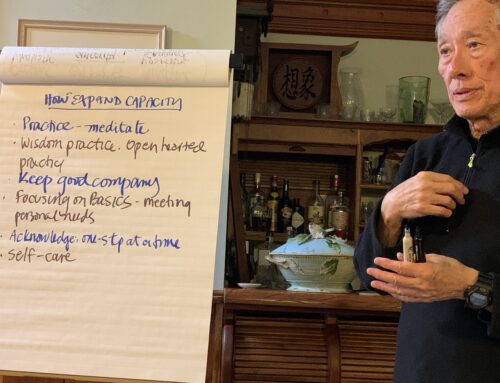 Upon reading a couple of things the other day, something became very clear: there is no peace—and all that it entails—without resolve. We can think we want something—like peace—but if we only remember this when we’re sitting, or on retreat, or in a nice quiet place on our own, then we don’t yet have the resolve to make it an ongoing reality.
Upon reading a couple of things the other day, something became very clear: there is no peace—and all that it entails—without resolve. We can think we want something—like peace—but if we only remember this when we’re sitting, or on retreat, or in a nice quiet place on our own, then we don’t yet have the resolve to make it an ongoing reality.
Here’s what I read. Firstly, from the Magga-vibhanga Sutta:
And what is right resolve? Being resolved on renunciation, on freedom from ill will, on harmlessness: This is called right resolve.
And secondly, from A Course in Miracles:
Vigilance does require effort, but only until you learn that effort itself is unnecessary. You have exerted great effort to preserve what you made because it was not true. Therefore, you must now turn your effort against it. Only this can cancel out the need for effort.
Resolve. Vigilance.
If you’ve ever been on retreat, you’re probably familiar with the retreat ‘high’ that many people experience. You get to a point—usually towards the end of the retreat—where you start seeing really clearly; everything makes more sense than it had previously, and now you’re ready to take on the world. And then you leave the retreat, and BAM! two days later you’re the same pumped up stress ball that you were before the retreat.
What happened to the happy little Buddha (or Christ, or Mahavira, or Sunrta, or Euphrosyne, or Mickey Mouse, it really doesn’t matter) who left that retreat? Well, you may also well ask, what happened to your resolve?
At the retreat, you’re in a space where everyone shares the same resolve, and where that resolve permeates everything that happens there. When you get home, the resolve dissipates. There’s work, family, dinners, dishes, commitments, etc., and you’re probably finding that they’re more crunched together than before because you’ve just been on retreat for a week or two. You still have resolve, but now it’s to get things done, rather than to be in peace (or whatever you were resolved to achieve while on retreat).
Resolve, in and of itself, is not altogether uncommon. What is uncommon is the resolve to be peaceful, to be happy, to be awake. If you have some resolve towards this end you may go to church or synagogue or temple once a week, or you may meet with like-minded people on a regular basis. With a little more resolve, you may meditate daily, or regularly read texts that help you find that space. These are all great steps on the path, but to really come home to the peace that lies within us requires constant vigilance, determination, and attention. At least—as A Course in Miracles points out—until it becomes so ingrained in your psyche that no effort is required at all.
Really, we’re all resolved. Only most of us are resolved to continue suffering; to continue experiencing stress, and doing everything we can to forget, to deny, who we really are. It’s all a question of priorities, and most of our priorities are really messed up.
What’s your priority? Is it peace? Is it joy? Is it awakening? Here’s the thing: it doesn’t matter what you say, what you do gives us the answer. If you are not experiencing peace, joy, or awakening, then chances are your resolve is not primarily directed towards them. This doesn’t need be a concern, unless you truly want to make these things your priority. If you do, be vigilant for this and nothing else. I’m telling myself I’d like to join you.




Thanks Jamie. Reading this post, I realized that, sooner or later, my resolve is triggered whenever I am not feeling peaceful; however, the triggering can take a while. Being vigilant would mean recognizing the lack of peace sooner….